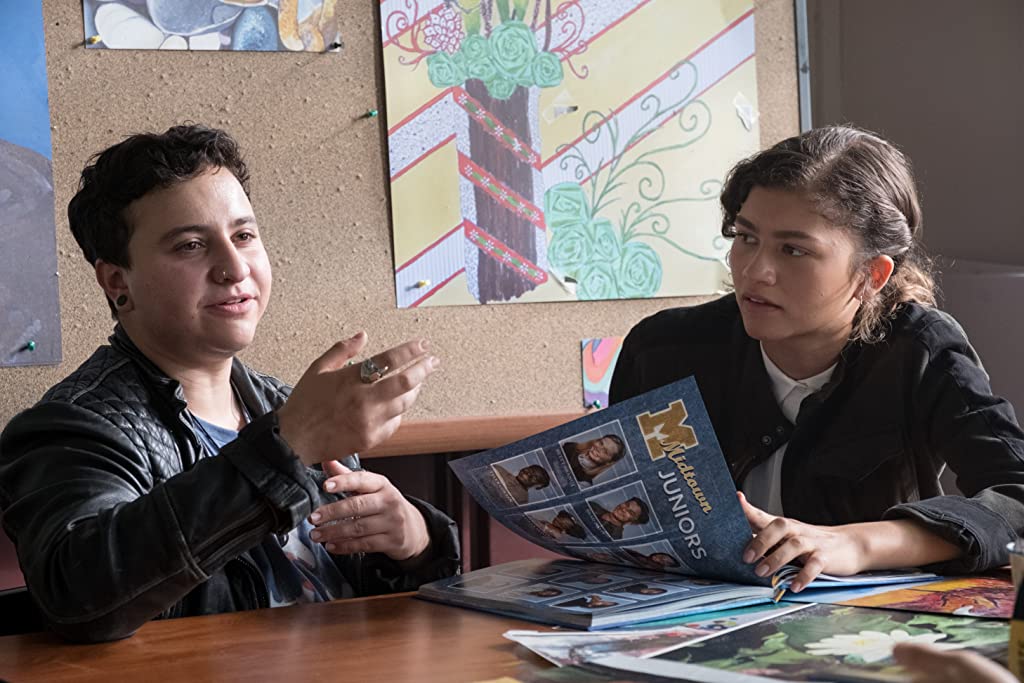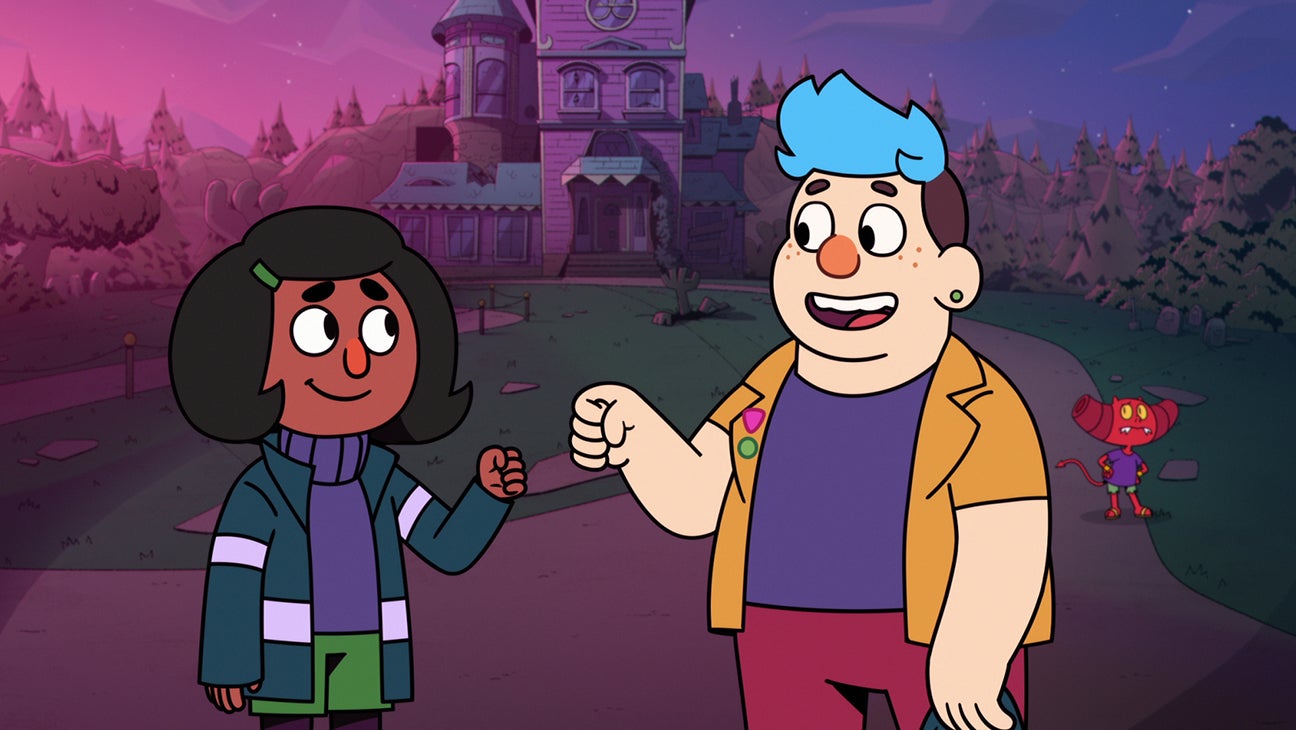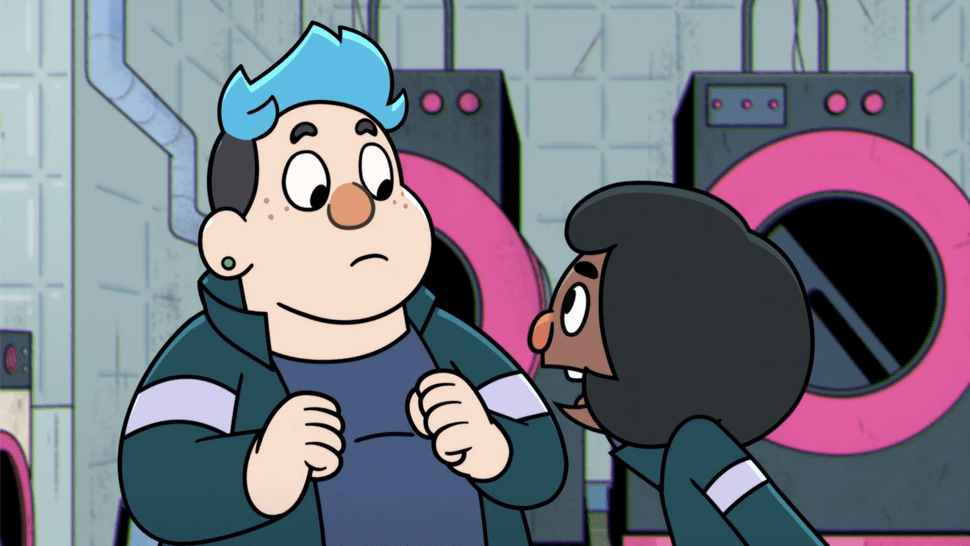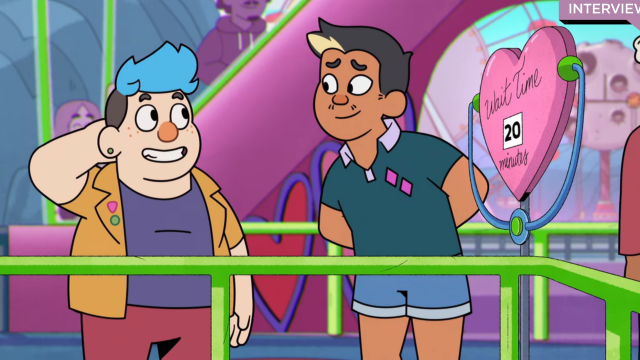Zach Barack is already used to making history. The first openly trans actor to appear in an MCU project, his brief moment in the spotlight as a classmate of Peter Parker in Spider-Man: Far From Home now gives way to another breakthrough moment as the voice of Barney in Netflix’s Dead End: Paranormal Park.
An animated adaptation of the Hamish Steele comic DeadEndia, Paranormal Park — which began streaming on Netflix last month — follows Barney, a queer trans teenager, as he escapes his difficult home life by throwing himself into his new job at Phoenix Parks, a Dollywood-esque amusement park themed around fictional film star Pauline Phoenix. When Barney and his new friend/fellow newbie-on-the-job Norma (Kody Kavitha) discover there’s something much more supernatural going on at Phoenix Park, they’re thrust into adventures with ghosts, demons, and solving the mysteries of just what keeps happening to the park’s Pauline impersonators.
Aside from tackling Barney’s struggles with acceptance at home — and a fraying relationship with his parents, who’re unwilling to back him up — Dead End is laden with touching queer storylines and characters. It’s a fun supernatural adventure series that just also happens to very casually accepting and honest about the need to put characters like Barney at the front and centre of stories for all ages. To learn more about his experience voicing Barney on the show, what it was like joining the MCU, and how it feels to have risen to new heights of prominence as a trans actor amid the horrifying persecution of trans people’s rights across the U.S. and beyond, Gizmodo recently spoke to Barack over email. Check out our full interview below.
James Whitbrook, Gizmodo: Before we get to Dead End, I wanted to ask about your experience on the set of Spider-Man: Far From Home. What was that like for you as an actor?
Zach Barack: I’ll say it was like being tossed into a wave pool — not because it was scary or anything. It was just different from your regular pool. I haven’t been in a wave pool since — if that makes sense. I haven’t worked on a project as locked down and top secret, that risked spoilers of a huge level. I thought all sets would be like that, but that’s Marvel, you know? All to say, it was unique and wonderful. I got paid to go to Europe for the first time with people who were fun to spend time with and I got to be in a movie. Everyone was kind and taught me a lot. I’m still close with folks too, so it’s the gift that keeps giving.
But it was also weird — I’ve heard other actors say this, but it’s tough to have a small role on your first go about because you’re so excited and want that big break right away. But it was weird because simultaneously I had to talk about this little part as this big deal because I was the first openly trans actor at the time of filming (even though technically there are other trans people who are in Marvel properties like Josie Totah, for example).
So I’m forever grateful because it was a hell of a first job, and I learned so, so much. Yet, it’ll always be weird to parse because I was just paying my dues as an actor, but with some really cool (and emotionally heavy) press that would make you think I was the star.

Gizmodo: It also means that you now have the honour of being the first openly trans actor in the MCU. Where do you want to see those films go next in terms of bringing in trans voices and, hopefully bringing trans characters to the big screen?
Barack: I want them to give trans people big parts. And not ones that have to be all about being trans. Let one of us bang an Avenger, because we’re hot! Or let us be an Avenger… because WE ARE HOT!!!
We so often default to thinking characters are cisgender so that when a trans person is cast, everyone is like — so is this character trans? And it’s like — they could have been from the get-go! You’re making an assumption based on norms. So casting trans people without having to acknowledge gender identity in the story is important because that’ll break that assumption which leads to so much dehumanization and, subsequently, violence. We can tell stories about transness, but let trans people do that and stop oversaturating film such that the only time trans actors are on screen, it’s sad or written like we’re robots who only talk about three things (where two of them are always pronouns and hormones).
The point is I want to play a dumb, sexy action hero and I don’t want it to be a story about how my hormones or family are some sort of issue in my life because I’m trans. I want the story to be about how dumb and sexy I am… or something!
I know it was a big deal that I was in the movie in terms of press, but in the scheme of things, it was lacklustre in terms of meatiness. It’s normal for a first job, but not when it’s something you have to talk about on a global level. I am so lucky and grateful, but at the same time, trans people deserve the spotlight — especially if they’re going to talk about their identity for press purposes.
Gizmodo: So, Dead End. We’re a little bit out from the show’s launch now. What’s it been like in hindsight seeing the reaction to the show, and people connecting to Barney?
Barack: I’m so happy about it. I would do anything to give people what I craved as a kid, even though I admit it makes me a little jealous. Knowing it’s actually working — that people are watching it and feeling seen — that’s everything you can ask for as an actor. Or just a person. It’s deeply human to say “I relate,” you know?
Also, I love being trans and it’s genuinely only a problem for me when it’s a problem for someone else. So, on a personal mental health level, it was nice that my timeline was flooded with kind things about trans people and what it meant to them. It was nice to not have someone accusing me of being a hindrance, because I personally really like myself and think I’m hot and also sexy. I don’t worry about that being untrue unless a dickhead is in my mentions saying I should. So it was cool for my mentions to be so wonderful for a while.

Gizmodo: Tell me a little bit about how you came on board the series, what the casting experience was like for you.
Barack: Well my voice-over agents are superstars. Pat Brady and Sam Frishman in particular took lead on this — they knew it would be a cool project and a perfect fit, so they did their thing and made sure I did a really solid recording to send it.
Also, I happen to know Hamish saw my TedX Talk and thought I was funny. So more than anything I was helped getting the role by my friends who tirelessly listened to 100 drafts of that TedX Talk and helped me get that confidence.
I will say reading the comics lit a fire under my arse, too. Hamish can write. Read the comics. Tastefully ladened with class discourse, demonizing queer people, queering demons, etc. It’s brilliant. He’s brilliant. We’re gonna work together again and again.
Gizmodo: How formed was Barney on the page when you were beginning to record the series? Did you have a chance to provide input about Barney’s own journey as a trans kid?
Barack: Well, the writers are mostly queer and created a really wonderful space together from what I hear. Which is just to say, I didn’t have to say too much. They knew how to put together a story that wasn’t overly tragic or played out. It was a clever, nuanced take on the ways parents fail us, and the way that Barney contains multitudes beyond that one aspect of him. He’s trans AND so many other things — like gay. HA!
If I had any feedback, Hamish made it pretty clear I wouldn’t have to be uncomfortable — even just in his outreach and kindness. I knew if I had a problem I could have said something, but I didn’t. Not once.

Gizmodo: I wanted to ask about the scene where Barney comes out to Norma; there’s no major build-up but it’s a very frank moment for Barney. What was it like preparing for that moment, and how did you approach playing that scene out when you were recording?
Barack: I just let it happen. I knew that experience inside and out, so it was one of those times as an actor I just had to feel my feelings. I almost cried — that’s literally one surefire way to get me — a coming-out scene that ends positively. You just don’t see it enough.
In the end, it felt too joyful to really get into a place where I was sobbing or anything. I think you can hear my voice break because it was so emotional to get to say “I’m trans” and know for Barney, he was just letting Norma in on something he’s actually very comfortable with — not some horrible condition he has to deal with and comes to terms with, but instead something he only has to navigate if other people force him to do so.
Gizmodo: Another highlight of the series was the musical episode in the climax, and Barney gets his big romance song over his feelings for Logs. When did you know the show was going to head into its first finale with a musical, and you’d get a major number? What was recording that episode like in particular for you?
Barack: I knew I would get to sing, because my agent told me. I didn’t realise it would be a whole musical episode until a bit into recording the season. Getting a number felt important. I have an ego so I think I would have been a little bummed if I didn’t get to sing, but I also just think Barney (and all the queer kids) deserve a ballad to express their feelings.
It was wild to record because I have been the world’s biggest Fall Out Boy fan since I was a kid. My best friend Chloe and I went to the “Believers Never Die” tour and Patrick Stump actually happened to grow up in the same random suburb as me, and was a legend, so it all felt super poetic. I never told him I was a fan, but I YELLED when I got the email with the music and put it all together. And he’s the most cool and kind person because he was like “if you can’t hit something or harmonies are hard, we’ll break it down in the easiest way.” So I didn’t feel like an amateur doing my first major musical number. I felt like someone who was learning something with a coworker showing me the ropes. A coworker whose music I happened to aggressively listen to as an emo youth.
Gizmodo: Trans people are facing so many hardships and levels of persecution right now. What’s it meant to you as a trans man to be in this moment, leading your own series, and having people fall in love with a character like Barney?
Barack: I don’t have enough words for it. It has been the honour of a lifetime. And I hope I get to work more, on camera and in voice-over, but if God forbid this is my last job, it was full of substance and heart and wonder. I can’t speak for anyone else, but watching 300 or something anti-trans legislative proposals come up for voting this year, I needed this. Desperately. Like even just to know the writers room and animators and actors cared, that’s something. And then seeing that fans cared, that’s even better. It was really a dream job. I’m not sure I’ll ever experience anything like it again, but I’ve been spoiled for loving everything about a job from the top to the bottom.
I’m so grateful to the writers — how hard they worked to be attentive and clever and conscious. The people who sat in a room and dug in because it was important to them to do a good job on a kid’s animated show — a medium that’s hardly ever properly critically acclaimed in spite of how much work is done to make quality TV that appeals to so many ages.
I’m so grateful to the countless hands put on this in the animation phase — the people who modelled the whole park in 3D just to turn it back into 2D so the viewer could have a special experience. Or the people who threw together Pugsley’s musical number at the last minute with limited resources. The people who had so much to do. Again, people who don’t get the awards by the armful.
I’m grateful to an incredible main cast and guest stars galore. I really, really admire everyone on the call sheet. I admire my friends that I’ve made in spite of distance. How they made it work recording in a closet or under a blanket or driving to the studio in uncertain times. It’s magical how important it was for everyone.
Dead End: Paranormal Park is now streaming on Netflix.
Want more Gizmodo news? Check out when to expect the latest Marvel and Star Wars releases, what’s next for the DC Universe on film and TV, and everything you need to know about House of the Dragon and Lord of the Rings: The Rings of Power.
